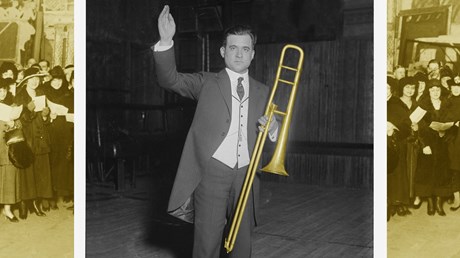Meet the Middling Musician Who Helped Launch the Gospel Music Industry
Homer Rodeheaver was an unexceptional trombonist. But he had an ear for great songs and a knack for promoting them.

Like most kids growing up in mainstream Protestant denominations in the mid-20th century, I associated the name Homer Rodeheaver—if it came up at all—with hymnals and gospel songs, most notably my grandmother Allie’s beloved “The Old Rugged Cross.” As an adult immersed in Black gospel music, I’ve paid little attention to the mostly sketchy scholarship on Rodeheaver. His Billy Sunday–styled revivalism, mass community sings (involving mostly white singers), and trombone-heavy stylings seemed to barely intersect with my work. His association with Sunday was especially troublesome in an Elmer Gantry sort of way.
As it turns out, I was wrong on nearly every count.
Homer Rodeheaver has quite a lot to do with all kinds of gospel music, as Kevin Mungons and Douglas Yeo demonstrate in their fascinating, eminently readable biography of a wildly underrated and rarely appreciated figure who made a significant impact on sacred music, Black and white. Homer Rodeheaver and the Rise of the Gospel Music Industry introduces readers to a man who was clearly long overdue for a scholarly reappraisal.
Mungons is a well-respected writer and researcher; Yeo a master of the trombone, having performed with major symphonies and taught at the university level. Together, they untangle a number of personal, professional, and musical knots in Rodeheaver’s fast-paced, eventful, and woefully underdocumented life.
Barnstorming the nation
In the authors’ telling, Rodeheaver emerges as a complex, creative, entrepreneurial marvel, capable of predicting (and profiting from) future trends in sacred music. They reveal how he was able to promote African Americans and their gospel songs even as he (apparently) turned …
